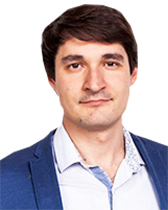On Nov 1, Russia imposed sanctions on 322 Ukrainian nationals and 68 companies from Ukraine. Among the individuals and entities subject to sanctions there are judges of the Constitutional Court of Ukraine, deputies of the Verkhovna Rada of the VIII convocation, major Ukrainian businessmen and their companies, Presidential Administration officials, and heads of executive bodies.
The history of how the sanctions list emerged remains rather strange. Experts say there were several factors that triggered it, but the most important thing is that it appeared after the so-called pension reform in Russia and the defeats the pro-Putin United Russia Party suffered in local elections across Russia's regions. In general, the sanctions were announced against the background of Putin and Medvedev's dropping personal ratings dropping to catastrophic levels (well, that's in their own understanding).
It is worth noting that Russia has always overcome its internal crises through external aggression. If we recall Putin's first election, there erupted the Second Russian-Chechen war, those weird explosions at apartment blocks in the Russian capital... Then, the Crimea annexation also took place ahead of the presidential elections in Russia... In the current situation, Ukraine is the best stimulus, since Putin's entire propaganda machine is working against Ukraine. That is, Ukraine is Enemy No.1.
Plus, it's very interesting that it was Mr Medvedev who drafted and promoted the sanctions list. It was his reputation that suffered the most after the introduction in Russia of "pension reform" (de facto, this is not a reform, but simply the retirement age rise amid a shrinking budget).
Also, let's recall how they presented the list: 'We want to impose sanctions against Ukrainian politicians who act aggressively against Russia; and against those who make money in Russia.' That's if to say that these companies make huge profits in Russia while the situation there is disastrous… This was the criteria for targeting Ukrainian businesses, it seems.
Plus, it's very interesting that it was Mr Medvedev who drafted and promoted the sanctions list
Let's take, for example, the Kharkiv Tractor Plant and the Kremenchuh-based AvtoKrAZ. In this case we are talking about the machine-building industry, which is currently on the rise. These enterprises have large sales markets in Russia as they'd had had corresponding production links since the Soviet era: Russia had been close with the two factories. That is, the Russians act logically and pragmatically when they introduce a protectionist policy under the guise of sanctions.
However, in fact, for Ukraine these sanctions are also beneficial. The Kharkiv Tractor Plant and AvtoKrAZ are the main factories restoring Ukraine's military-industrial potential. Now these plants will at the same time focus on domestic market and look for points of entry in foreign markets.
I should recall that the official U.S. trade mission has arrived in Ukraine for the first time in 10 years. These are the delegates from 12 U.S. companies representing American agriculture, energy, infrastructure and the IT sector. So, right now we can talk about expanding our presence in international markets and profiting there. For, in fact, the Ukraine-made military equipment is not only competitive, it also has some advantages – it is being tested in war conditions, which is of course unfortunate for the Ukrainian nation in general. Therefore, the Kharkiv Tractor Plant and AvtoKrAZ could use these sanctions for their own boost.
However, in fact, for Ukraine these sanctions are also beneficial
In general, let's be objective, it was Ukraine who was first to introduce sanctions lists against Russia, although they were never of such a large scale. The Russian list is way more extensive than all of our previous ones. Now, it is quite obvious that Ukraine should, or even must, introduce asymmetric sanctions. In particular, it is necessary to impose sanctions against Russian companies that are still working in Ukraine and making money here. However, our list should be longer, and sanctions – harsher than Russian ones - this is a matter of principle.
Viktor Taran is a chief of Eidos Center, political scientist, candidate of science in public administra


